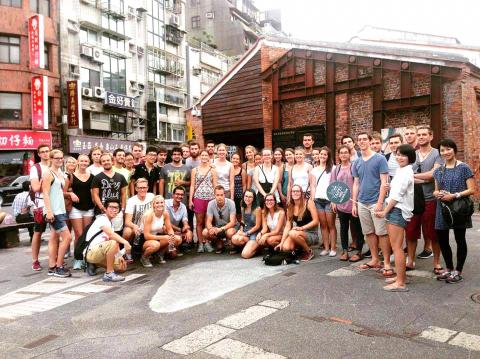When Becky Liu (劉樾) visited the Plum Pavillion (梅亭) in Taipei’s Beitou District (北投), it reminded her of her great-grandfather, who, like the pavilion’s former resident, former Control Yuan president Yu You-jen (于右任), was an expert calligrapher.
“Through this connection, I can tell [tourists] about calligraphy in our culture and what it represents,” she says.
This is one of the personal experiences that local tour guides will relate during Sunday’s Beitou, Hundred Years a day walking tour, organized by Like It Formosa (來去福爾摩沙), formed by a group of twenty-something locals dedicated to a variety of walking tours all conducted in English.

Photo courtesy of Like It Formosa
“We want our guides to not read from a book but to incorporate their personal experiences and serve as storytellers and performers,” says founding member Julia Kao (高于晴). “We want to present to foreigners the perspective of local young people.”
She adds that visitors have joined the same tour multiple times just to hear different tour guides share their experiences.
Formed early last year, Like It Formosa started out last September and October with two pay-as-you-want weekly walking tours of Taipei — a historic one every Thursday that takes people through the old Taipei neighborhoods on the western end, and a modern one every Sunday that shuffles through the bustling East and Xinyi districts from Sun Yat-sen Memorial Hall to 44 South Village (四四南).
They launched their first paid tour in November — an LGBT Taipei one that took visitors to locations such as an LGBT bookstore and Rainbow Sauna (彩虹會館), a 24-hour gay establishment. Sunday’s Beitou tour is their first time taking people to northern Taipei, and they have more tours planned for later this year.
These young Taiwanese aren’t just looking to show foreigners what Taiwan is about. They say it’s also a self-exploration of what it means to be Taiwanese, which is a question local students especially struggle with when asked to present their culture while studying overseas.
“When I went on the tours myself, I felt pretty impacted,” Kao says. “To locals, it’s a chance to get to know Taiwan all over again.”
“When we pass by the Presidential Palace, we can discuss the protests and democracy in Taiwan,” Liu adds. “In Ximen, we can talk about Japanese influence on the city. Through exchanges with tourists, we can in turn ponder deeper questions about where we live.”

In Taiwan there are two economies: the shiny high tech export economy epitomized by Taiwan Semiconductor Manufacturing Co (TSMC, 台積電) and its outsized effect on global supply chains, and the domestic economy, driven by construction and powered by flows of gravel, sand and government contracts. The latter supports the former: we can have an economy without TSMC, but we can’t have one without construction. The labor shortage has heavily impacted public construction in Taiwan. For example, the first phase of the MRT Wanda Line in Taipei, originally slated for next year, has been pushed back to 2027. The government

July 22 to July 28 The Love River’s (愛河) four-decade run as the host of Kaohsiung’s annual dragon boat races came to an abrupt end in 1971 — the once pristine waterway had become too polluted. The 1970 event was infamous for the putrid stench permeating the air, exacerbated by contestants splashing water and sludge onto the shore and even the onlookers. The relocation of the festivities officially marked the “death” of the river, whose condition had rapidly deteriorated during the previous decade. The myriad factories upstream were only partly to blame; as Kaohsiung’s population boomed in the 1960s, all household

Allegations of corruption against three heavyweight politicians from the three major parties are big in the news now. On Wednesday, prosecutors indicted Hsinchu County Commissioner Yang Wen-ke (楊文科) of the Chinese Nationalist Party (KMT), a judgment is expected this week in the case involving Hsinchu Mayor Ann Kao (高虹安) of the Taiwan People’s Party (TPP) and former deputy premier and Taoyuan Mayor Cheng Wen-tsan (鄭文燦) of the Democratic Progressive Party (DPP) is being held incommunicado in prison. Unlike the other two cases, Cheng’s case has generated considerable speculation, rumors, suspicions and conspiracy theories from both the pan-blue and pan-green camps.

Stepping inside Waley Art (水谷藝術) in Taipei’s historic Wanhua District (萬華區) one leaves the motorcycle growl and air-conditioner purr of the street and enters a very different sonic realm. Speakers hiss, machines whir and objects chime from all five floors of the shophouse-turned- contemporary art gallery (including the basement). “It’s a bit of a metaphor, the stacking of gallery floors is like the layering of sounds,” observes Australian conceptual artist Samuel Beilby, whose audio installation HZ & Machinic Paragenesis occupies the ground floor of the gallery space. He’s not wrong. Put ‘em in a Box (我們把它都裝在一個盒子裡), which runs until Aug. 18, invites